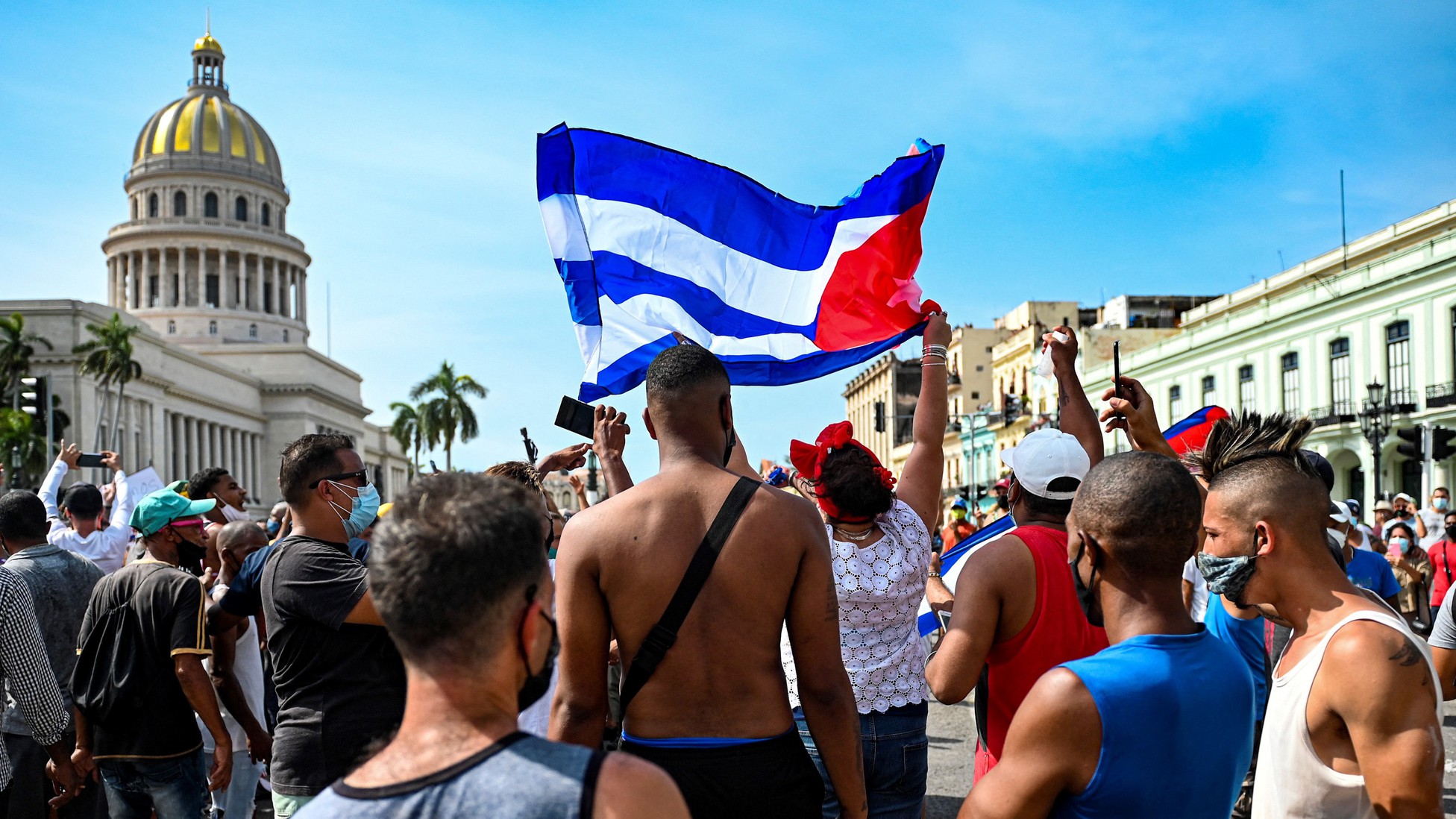Last Sunday, Cubans in a small town 16 miles from Havana filled the streets to demonstrate against the government. The unrest quickly spread on social media, igniting protests across the island, marking the first such nationwide wave of protest in the communist country in decades.
On Thursday, the Black Lives Matter Global Network Foundation, the leading organization in the Black Lives Matter movement, issued a statement saying that the unrest resulted from the “U.S. federal government’s inhumane treatments of Cubans.” BLM called for lifting the American embargo, which, it says, undermines “Cubans’ right to choose their own government,” and is punishment for Cuba’s “commitment to sovereignty and self-determination.”
At first glance, the statement might seem to signal solidarity with the protesters, but BLM is actually repeating Communist officials when it blames the uprising on the United States. And that misses the point of the protests. To the surprise of the Black community in Cuba and those in exile, the organization is overlooking what has triggered the events—Cuba’s systemic denial of rights to its people, poor material conditions, lack of social mobility, and the inequality that plagues all Cubans but disproportionately Afro-Cubans, who are at the forefront of the widespread demonstrations.
The sympathy that BLM expresses for Cuba’s Communist government is steeped in a sense of Cuba as it was in the 1980s—and that Cuba no longer exists. Like the United States, Cuba had a long history of slavery, followed by various forms of institutional racism. The Cuban Communist revolution in 1959 resulted in socioeconomic opportunities for Black and mixed-race Cubans. Resources from the former Soviet Union helped bolster the economy and reduce historical disparities. Cuba under Fidel Castro was a dictatorship, but it’s also true that racial equity in education, life expectancy, and employment improved for a time during his tenure.
The official BLM statement points out that the Cuban government has acted in solidarity with historically oppressed Black people, including offering political asylum to the American Assata Shakur, a former member of the Black Liberation Army, and supporting African countries in their struggle for independence. Fair enough. However, the Cuba to which Shakur moved in 1984 does not exist anymore. It was possible in the early 1980s to turn a blind eye, as many did, to the authoritarianism of the Castro regime. After all, subsidized by the Soviet Union, Cubans were living in relatively equal material conditions. They had free access to a quality public-school education and excellent health care. Now the idealized Cuban regime that BLM praises is long gone, if it ever really existed.
After the collapse of the Soviet Union, the Cuban economy crumbled. During what is called the “special period” in the early 1990s, Cubans faced widespread food rationing and severe energy shortages. Under pressure, Castro allowed the circulation of U.S. dollars through remittances and tourism. To everyone’s surprise, he permitted Cubans to operate small private businesses. During this time of economic liberalism, however, Cuba’s racial inequalities resurfaced.
Remittances and tourism are the government’s most important sources of income. Yet the inequality in these arenas is stark. Sixty to 90 percent of white households have some relatives living outside the country; for nonwhite people, the numbers are much lower, at about 30 to 40 percent. Those statistics mean that foreign currency coming into Cuba primarily benefits white Cubans. Black Cubans who do not have a relative living abroad are destined to work in the low-wage, state-controlled economy; in the black market; or in the emergent private sector. As the Harvard professor Alejandro de la Fuente has pointed out, many private-sector business owners discriminate against Black job applicants, a prejudice visible in the tourism industry.
Unfortunately, the inequality has gotten worse. Students in Cuban universities today are overwhelmingly white or light-skinned; only 4.8 percent are Black or brown at the University of Havana, for example. The prison population is disproportionately Black. Black neighborhoods are the poorest in Havana. “While 58 percent of white Cubans have incomes under $3,000,” de la Fuente wrote in The New York Times, “among Afro-Cubans that proportion is as much as 95 percent.”
Although the embargo has undoubtedly played a role in the economic woes of Cuba, the main obstacle to Cuban development and prosperity is the government’s model of a state-controlled economy, a system in which Cubans cannot materialize their entrepreneurial energy, in which a policing regime frequently stops Black Cubans, and in which everyday items are hard to find.
Not surprisingly, Havana’s primarily Black neighborhoods, the most neglected in the city, are the epicenters of the largest recent demonstrations, as footage shows. In some of them, such as La Güinera, Centro Habana, Diez de Octubre, Cerro, and La Habana Vieja, we’ve seen clashes between demonstrators and the police and members of the government posing as civilians. As a result, Black Cubans, along with compatriots of all races, are disproportionately being beaten, brutalized, and jailed for protesting. The government is publicly calling them “thugs” and “criminals” in the state-controlled media. The Cuban government has officially acknowledged the death of Diubis Laurencio Tejeda, a young Black man from La Güinera who died during a confrontation with the police.
Cubans—and particularly Black Cubans—are suffering. The Cuban judicial system is prosecuting the protesters with sentences of up to 20 years. BLM, of all organizations, should be aware that Cubans can’t breathe either. Black Cuban lives also matter; the freedom of all Cubans should matter. To echo the organization’s stated reason for existing, no one is free until we are all free.

